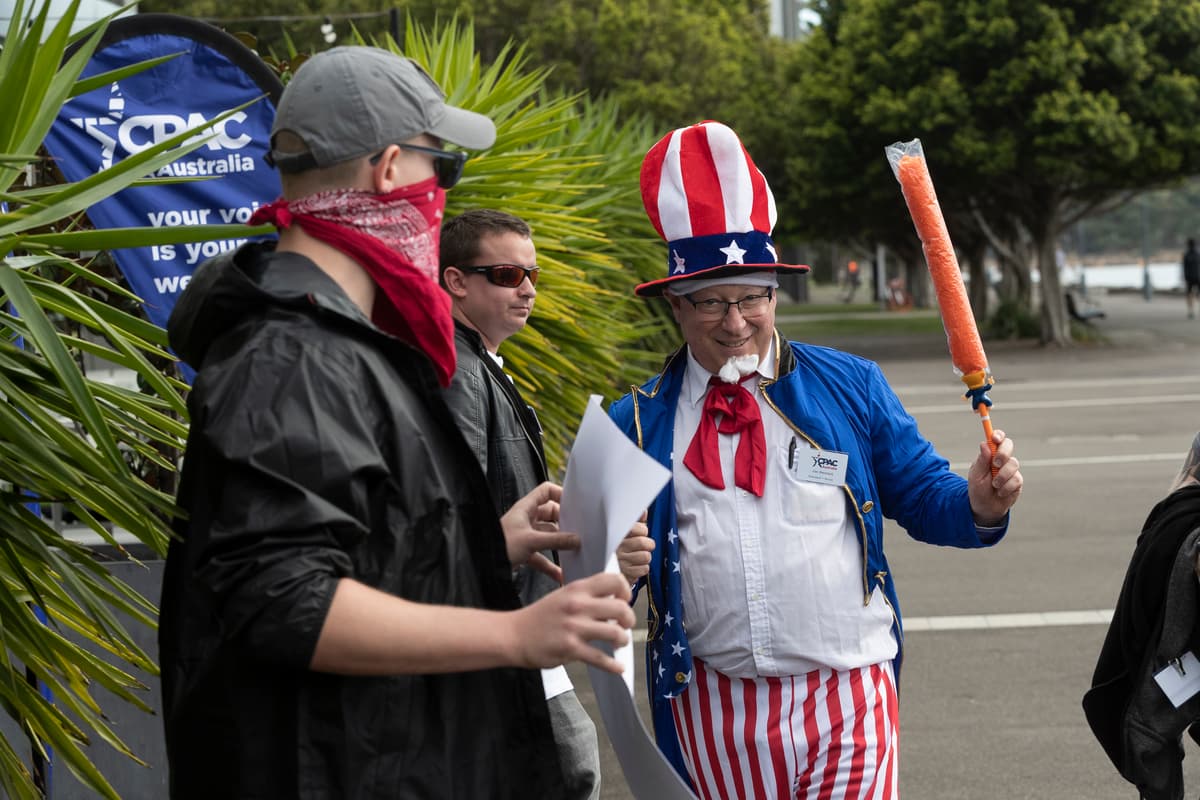CPAC Comes to Australia as Opposition Grows to Referendum on Aboriginal Rights
President Trump’s disciples, such as the former attorney general, Matt Whitaker, mingle with the burgeoning conservative movement in Australia, which has been galvanized by opposition to a proposed constitutional amendment creating an ‘advisory board’ to advocate for Australia’s Aborigines.

The political landscape of Australia is changing, with conservatives becoming more restive and vocal. One flashpoint is an upcoming referendum on a proposal to amend Australia’s constitution to create an “advisory body” for Indigenous Australians, known as The Voice.
So far, according to some polling, the referendum, slated for October 14, is unlikely to pass despite strong support from younger voters and urban, elite institutions like the press, academia, and the corporate boardroom. Rallying opposition to The Voice and other “woke” policies has created an opportunity for the Conservative Political Action Coalition.
CPAC Australia, which I attended at Sydney in August, has become one of the most significant annual events on the nation’s political calendar. CPAC has gotten a reputation for loudly embracing the nationalist populism associated with President Trump and Governor Desantis at the expense of the old-fashioned conservatism of President Reagan and Prime Minister Thatcher.
While this year’s American event in Maryland commanded smaller crowds, due in part perhaps to CPAC chairman Matt Schlapp facing sexual harassment allegations — which he denies — the American Conservative Union, which oversees CPAC, has been looking to extend its reach beyond America to smaller countries that are seeing a growing conservative moment.
CPAC conferences have been held in Hungary, Brazil, Japan, South Korea, and Mexico. Unfortunately, these events can be loud and crass, bordering on a caricature of what people think conservatives could be. At first glance, Australia might seem an unusual locale for one of these satellite CPAC events. It has yet to experience the populist moment that Hungary and Brazil have undergone.
When it comes to politics, Australia has proven to be good with governance and less polarized, with the public having more trust in its institutions than the citizens of other ex-Commonwealth countries. Yet it is the country’s fraught relations with Aborigines and Torres Strait Islanders that have always been in contention.
In the conference’s keynote address, the former prime minister of Australia,Tony Abbott, urged his audience to reject The Voice with “an astounding ‘No’ … The last thing we should be doing,” he argued, “is entrenching victimhood and institutionalizing grievance in our governance arrangements.”
Thus far, The Voice has been described by the Wall Street Journal’s American writer Jason Riley as a “racial welfare state.” To The Voice’s opponents, it is a symbolic piece of policy that wouldn’t address the massive wealth and power disparities facing Australian Aborigines, especially those living in remote areas. Polls have seen increasing disapproval for the proposal.
In addition to denouncing The Voice referendum, CPAC is joining the culture wars in other ways as well. That includes rallying opposition to a bill being pushed by the Australian Labor Party, led by Prime Minister Albanese, to enforce new laws against “misinformation.”
While Australia doesn’t have America’s strong free speech culture, any violation of this proposed law could lead to online platforms facing millions of Australian dollars in fines. Some conservatives fear that anything could be categorized as “misinformation” or “disinformation,” including heartfelt positions on Covid lockdowns and vaccine mandates, which faced massive protests in 2021.
America’s CPAC has become a shadow of itself, partly due to Mr. Schlapp’s travails and the deep divisions among American conservatives over Mr. Trump. Yet if one wants to know who the conservative voters are in Australia, he or she would likely have found them at the Oz event where Australian conservatives mingled with Mr. Trump’s disciples, such as Mr. Trump’s former acting attorney general, Matthew Whitaker, along with the former Democratic Congressman turned Republican, Vernon Jones, and a former host at The Blaze TV, who was fired after being accused of groping a co-host’s breasts, Elijah Schaffer. Mr. Schaffer told his Twitter followers he couldn’t comment on the situation.
Despite such controversies, CPAC Australia gathered thousands of conservative activists and believers, including some members of the country’s large center-right Liberal Party, who feel disillusioned as the center-left Labor Party has swept federal and state governments across the mainland.
Mr. Schaffer appeared on stage to say he’s an Australian because he has an Australian wife and son. As a native-born Australian, it was hard for me to listen to someone with a sexual assault allegation hanging over his head proclaim his Australian pride while bashing the country on Twitter, as well as flirting with antisemitism to drive the worst instincts of his audience.
There was another speaker named Rodney Marks who appeared on stage as a United Nations diplomat, “Dr. Chaim Tsoibas,” for a comedic bit on stage. Mr. Marks delivered the poorest excuse for conservative comedy and proceeded to call Indigenous men “violent and Black” as a joke. This received press coverage that wasn’t good optics for an event trying to make a strong case against The Voice proposal, but instead validating the perception that Voice opponents are racists.
CPAC Australia was certainly a call to arms for happy warriors as it served up red meat. The Australian equivalent to Rush Limbaugh, Alan Jones, has said that sometimes you lose cultural battles because you didn’t fight. The question of whether the conference itself could be effective in promoting social conservatism in future Coalition governments has yet to be proven. Yet as opposition to The Voice gains momentum, it’s clear that a new conservative movement in Australia is gaining momentum as well.

